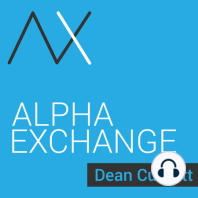63 min listen

Jonathan Golub, Chief U.S. Equity Strategist & Head of Quantitative Research, Credit Suisse
FromAlpha Exchange
Jonathan Golub, Chief U.S. Equity Strategist & Head of Quantitative Research, Credit Suisse
FromAlpha Exchange
ratings:
Length:
59 minutes
Released:
Mar 6, 2023
Format:
Podcast episode
Description
With 3 decades in markets, Jon Golub’s career is split evenly between the buyside and sell-side. Reflecting on his early days in the industry, Jon notes the especially benign environment that characterized the 90’s, a period of post-Cold War geopolitical stability, with the trauma of 70’s inflation sufficiently in the rear view even as the tail wind of lower interest rates was still a positive force in markets. While analyzing time series of economic and financial data is a critical part of his team’s process, Jon is careful not to draw broad conclusions because in market cycles, “this time is actually different” probably applies more often than not. He points to the less debt heavy capital structure of key segments of the S&P 500 today versus decades ago as a ready example of the unique attributes of different time periods.Our conversation shifts to Jon’s work as Chief US Equity Strategist and Head of Quantitative Research at Credit Suisse and his assessment of present day risks and opportunities. Here he makes the interesting point that the US economy is less sensitive to higher rates than it has been historically. But for stocks, the short rate does matter, especially in the context of what he expects to be a more challenging earnings outlook. He sees the impact of Fed policy at least partially blunted by a labor market that is even tighter than the headline unemployment rate suggests. Next, we talk about inflation and the various ways in which it impacts both corporates and the consumer. For the latter, inflation matters, but the healthy jobs market matters more, especially when set against the backstop of savings. For companies, margin compression, dwindling profit growth and a middling economy lead to what Jon characterizes as “stagflation light”. This less than rosy outlook is in the context of valuations that appear reasonably fair, especially when set against long term corporate bond yields.I hope you enjoy this episode of the Alpha Exchange, my conversation with Jon Golub.
Released:
Mar 6, 2023
Format:
Podcast episode
Titles in the series (100)
Eric Peters, One River Asset Management: Beginning his career in Chicago trading corn futures in the late 1980’s, Eric Peters moved into the sharp elbowed world of bond futures trading on the CBOT and then went to a bank, prop trading rates and derivatives through the 1990’s. His perspectives on the exchange rate mechanism crisis in 1992 and the bond market massacre in 1994 provide significant insight on the way in which policy frameworks invite risk taking that can ultimately lead to instability. Utilizing many of these lessons on risk, Eric founded One River Asset Management, a firm that delivers bespoke solutions to institutional investors, helping them navigate markets in the post-crisis era. As 2018 comes to a close, Eric sees a long period of adjustment to a higher volatility regime in both the risk asset complex as well as inflation. by Alpha Exchange